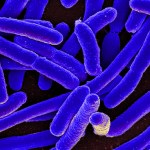Colistin
The first observation of a bacterial gene called MCR-1 in the United States has scientists worried, if not surprised. The gene provides resistance to colistin, an antibiotic with nasty side effects used to combat multidrug-resistant bacteria. On Aetiology, Tara C. Smith writes "colistin has seen a new life in the last decade or so as a last line of defense against some of these almost-untreatable infections." But now, bacteria wielding MCR-1 threaten to leave humans defenseless. On The Pump Handle, Liz Borkowski explains "MCR-1 is of particular concern because it’s carried on a plasmid, a…
E. coli, from Wikipedia commons
We've been expecting it, and now it's here.
Yesterday, two article were released showing that MCR-1, the plasmid-associated gene that provides resistance to the antibiotic colistin, has been found in the United States. And not just in one place, but in two distinct cases: a woman with a urinary tract infection (UTI) in Pennsylvania, reported in the journal Antimicrobial Agents and Chemotherapy, and a positive sample taken from a pig's intestine as part of the National Antimicrobial…
Last week was World Antibiotics Awareness Week, and a new study in The Lancet Infectious Diseases showed just how dire the antibiotics situation has gotten. Authors from the South China Agricultural University, the China Agricultural University, and other institutions identified a gene that confers resistance to a last-resort antibiotic, and then found that gene in E. coli isolates from 15% of raw meat samples, 21% of pigs about to be slaughtered, and 16% of hospital patients with infections. (The study is behind a paywall, but there's a helpful summary here.)
The authors warn that given…
